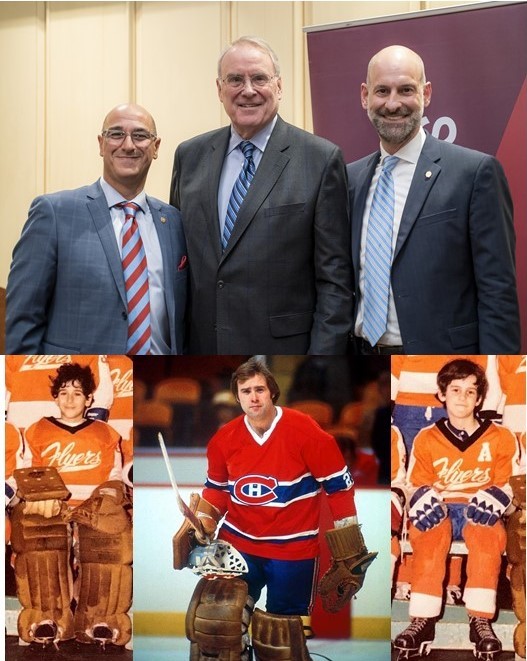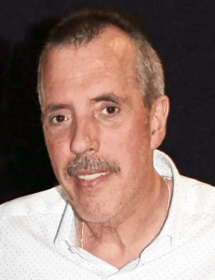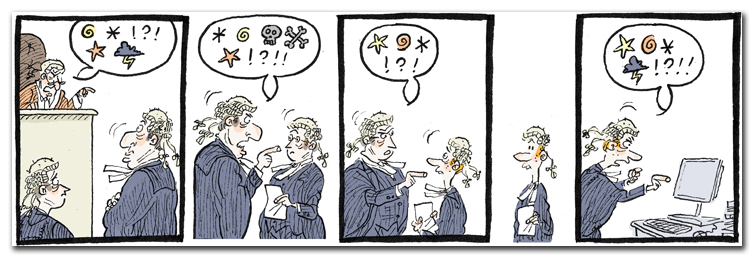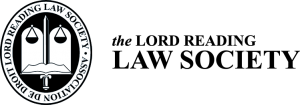NEWSLETTER – February 2020
Editors – Allen Mendelsohn & Larry Markowitz
President’s Message
Gregory Azancot, President

(le message en français suit l’anglais)
Dear Colleagues, Honourable Judges, and Friends of the Society,
There are a myriad of inspirational quotes about change – how it’s hard, why it’s a must and why nobody likes it except for a wet baby… well the Society over the course of its history has changed maybe subtly, maybe without very many people noticing or maybe in respect of things that, with the benefit of hindsight, were not as dramatic as we thought but yet were always steps forward and improvements.
I find it extremely difficult in these few lines allotted to me to convey all that I think I need to say to all of you – so to be concise I’ll borrow David Letterman’s format – here are, in no particular order, ten things (and not necessarily the top ten things) you need might want to know about the LRLS :
- As you have surely noted from media reports the Board chose, for what I believe is the first time in the LRLS’s history to intervene last November in a court proceeding concerning a contestation of Bill 21;
- We did this because we are an association of lawyers who share a passion for human rights;
- We are all individuals from various backgrounds with different points of view both as regards the world around us and the law – but as lawyers the vast majority of our membership believe that Bill 21 runs counter to the human rights of many Quebecers and this regardless of whether you agree or not with the societal issues this law proposes to deal with;
- We uphold the rights of those who disagree with our position. However, we appreciate when these opposing viewpoints are voiced respectfully and with civility;
- We are all volunteers and the lawyers representing us in our court intervention are doing so pro bono;
- We do not pay our speakers. The fee for attendance covers some of the cost of the dinner but as we have significant discounts for students, junior and senior members, we run a deficit at every dinner conference for which we seek sponsorships. We do not make money on our dinner-meetings;
- Our membership is not solely Jewish and we strive for full inclusion and diversity at all levels of the Society;
- Despite certain reports, we all read, write and speak French and have submitted all of our briefs to the National Assembly and our court intervention in that language;
- We respect the rule of law and as such have and shall continue to do what we believe is right, despite public opinion, to uphold that principle and protect all of its institutions;
- We are a law society not a dinner society. As such, we are and will remain willing to sacrifice all of our dinners, if necessary, to fight laws that we believe are discriminatory and violate the laws and Charters of Quebec and Canada.
All of this being said, we remain excited about our upcoming student dinner and will continue to encourage our student honorees and put forth speakers such as Professor Payam Akhavan who through his entire body of work inspires us by his attempts to perfect the world by performing the mitzvah of Tikun Olam – repairing the world.
*******************
Il y a une myriade de citations inspirantes sur le changement – comment c’est difficile, pourquoi c’est nécessaire et pourquoi personne n’aime ça sauf un bébé avec la couche pleine… eh bien l’Association au cours de son histoire a changé peut-être subtilement, peut-être sans que beaucoup de gens ne le remarquent ou peut-être en ce qui concerne des choses qui, avec le recul, n’étaient pas aussi dramatiques que nous le pensions mais qui étaient pourtant toujours des pas en avant et des améliorations.
Il m’est extrêmement difficile, dans ces quelques lignes qui me sont allouées, de vous transmettre tout ce que je pense devoir dire à tous – donc pour être concis, je vais emprunter le format de David Letterman – voici, sans ordre particulier, dix choses (et pas nécessairement les dix premières) que vous devez savoir sur le LRLS :
- Comme vous l’avez sûrement remarqué dans les reportages, notre conseil d’administration a choisi, pour ce que je crois être la première fois dans l’histoire de l’Association, d’intervenir en novembre dernier dans une procédure judiciaire concernant une contestation de la loi 21 ;
- Nous avons fait cela parce que nous sommes une association d’avocats dédiés à la promotion des droits de la personne;
- Nous sommes tous des individus d’origines diverses avec des points de vue différents tant en ce qui concerne le monde qui nous entoure que le droit – mais en tant qu’avocats, la grande majorité de nos membres pensent que la loi 21 va à l’encontre des droits de l’homme de nombreux Québécois et ce, que vous soyez d’accord ou non avec les questions de société que cette loi propose de traiter ;
- Nous défendons les droits de ceux qui ne sont pas d’accord avec notre position. Toutefois, nous apprécions que ces points de vue opposés soient exprimés avec respect et civilité ;
- Nous sommes tous bénévoles et les avocats qui nous représentent dans notre intervention devant les tribunaux le font pro bono ;
- Nous ne payons pas nos conférenciers. Les frais de participation couvrent une partie du coût du dîner, mais comme nous offrons des rabais importants pour les étudiants, les membres juniors et seniors, nous enregistrons un déficit à chaque dîner-conférence pour lequel nous recherchons des commanditaires. Nous ne gagnons pas d’argent sur nos dîners-conférences ;
- Nos membres ne sont pas uniquement juifs et nous nous efforçons de favoriser l’inclusion et la diversité à tous les niveaux de notre Association ;
- En dépit de certaines allégations, nous lisons, écrivons et parlons tous français et nous avons soumis tous nos mémoires à l’Assemblée nationale et notre intervention devant les tribunaux dans cette langue ;
- Nous respectons la primauté du droit et, à ce titre, nous avons fait et continuerons de faire ce que nous croyons être juste, malgré l’opinion publique, afin de faire respecter ce principe et protéger toutes ses institutions ;
- Nous sommes une société de droit et non une société de dîner-conférences. En tant que tel, nous sommes et resterons prêts à sacrifier tous nos dîners, si nécessaire, pour lutter contre des lois que nous estimons discriminatoires et qui violent les lois et les chartes du Québec et du Canada.
Ceci étant dit, nous restons enthousiastes à l’idée de notre prochain dîner d’étudiants et nous continuerons à encourager nos étudiants honorés et à proposer des conférenciers tels que le professeur Payam Akhavan qui, à travers tout son travail, nous inspire par son travaux à travers le monde en effectuant la mitzvah de Tikun Olam – réparer le monde.
Ken Dryden: Brain Injuries in Sports
Larry Markowitz

(left to right, top and bottom: Society President/Atom C Flyers goalie Greg Azancot, our speaker/Montreal Canadiens goalie, and this reporter/Greg’s Atom C defenceman)
To open 2020 in style, on January 15th, the Society was delighted to welcome lawyer, author, businessman, broadcaster, politician, Hockey Hall of Famer and six-time Stanley Cup-winning goaltender Ken Dryden, who delivered a provocative talk entitled, “When the Decision Makers Don’t Decide: Brain Injuries in Sports, and Other Matters”.
In a heartfelt tribute, Mr. Dryden was introduced by Society president (and fellow goaltender) Greg Azancot.
Our speaker was thanked by this reporter, who happens to have been Greg’s Atom C teammate (and defenceman) many years ago, at the same time as our guest speaker was leading Stanley Cup parades down the “usual route”.
The multitalented Mr. Dryden was described as “Canada’s Renaissance Man”.
Concussions in Hockey
In delivering his impassioned talk on player safety, Mr. Dryden explored the implications of inaction by those in charge of the sport of hockey, even when faced with clear evidence of the serious implications of concussions.
A concussion a brain injury. When an athlete hurts their knee, they walk with a limp. When an athlete injures their brain, “their whole being limps”.
Present and former NHL players have talked about the symptoms they’ve experienced after brain injuries from blows to the head. These include depression, memory loss, anxiety, loss of routine problem-solving abilities and a lack of anger control.
Mr. Dryden brought this phenomenon to the wider attention of the public in his 2017 bestseller entitled, Game Change: The Life and Death of Steve Montador, and the Future of Hockey.
In it, he tells the story of NHLer Steve Montador, who after his death, was diagnosed with Chronic Traumatic Encephalopathy (CTE), a neurodegenerative disease caused by repeated head injuries. In the book, Mr. Dryden outlines the evolution of the sport of hockey and provides prescriptions to counter what, in the author’s view, is its greatest risk for the future: head injuries.
The future of hockey depends on decision-makers making evidence-based decisions to ensure the health of players.
Attitudes in society shift. Attitudes at the highest levels of hockey have to change, too. Mr. Dryden drew parallels with society’s changing attitudes towards tobacco, asbestos, and now climate change. While in the past, the negative repercussions of each of these were ignored by decision-makers, the facts are now incontrovertible and mainstream attitudes have shifted.
Even in hockey, play-by-play announcers now spontaneously ask, “Was that a hit a to the head?”
Mr. Dryden was critical of Gary Bettman, who has been Commissioner of the National Hockey League since 1993. Mr. Dryden and Mr. Bettman are both lawyers and have known one another for a long time. Normally, claims Dryden, Mr. Bettman has a thirst for knowledge. However, when it comes to learning more about the effects of concussions — and acting — Mr. Bettman has not changed with the times.
NHL Commissioner Bettman’s Perspective
Last spring, Commissioner Bettman appeared before a government of Canada parliamentary subcommittee on concussions in sports. He argued that hockey is a game “played in an enclosed environment, at high speeds, by players of different heights, weights and skills,” and is, “by its very nature, a collision sport.”
“Fighting is thus a natural part of the game, that offers players a release at an emotional moment,” Mr. Bettman testified.
He cited the addition of Rule 48 to the NHL rule book, which, in his words, “prohibits all hits to an opponent’s head where the head was the main point of contact and such contact was avoidable.”
He pointed out that fighting is at its lowest level since 1964. Eighty-five per cent of the league’s games are now fight-free and the majority of the league’s players do not fight. He boasted of the league’s concussion protocol.
Mr. Dryden isn’t Buying these Arguments
However, Mr. Dryden retorted, most of the league’s actions kick in after the brain injury has occurred; after the damage has been done. Actions need to be taken to prevent head injuries from occurring in the first place. For instance, fighting should be banned outright.
“If fighting is natural and important, as Mr. Bettman claims, why is it down?” Mr. Dryden asked rhetorically.
- Why aren’t there fights every game? Isn’t every game “emotional”? Why do only 25% of the players fight, and many of them only once a season?
- Why don’t 100% of the players fight? Do they not play in the same enclosed space, at the same high speeds? Do they not “lose it” on occasion?
- Do Sidney Crosby, Connor McDavid and the rest of the league’s stars not have “emotional” moments? Did Bobby Orr, Wayne Gretzky, and Mario Lemieux not care?
-Ken Dryden
Mr. Dryden wants Mr. Bettman to be proactive to prevent head injuries; not just “manage” the situation.
There came a point when CEOs of producers of tobacco, opioids and asbestos could no longer just manage their situations. Willful blindness was no longer acceptable. The scientific evidence was clear. These leaders had to make concrete and drastic changes to their businesses.
To save the game of hockey, the NHL also needs to make concrete and drastic changes. And, according to Ken Dryden, the time is now!
A full set of photos from the evening can be found on our Facebook page
Remembering Armando Rodrigues, 1964-2020
Allen Mendelsohn

The Society was tremendously saddened to learn of the passing of Armando Rodrigues, a member of the Shaar Hashomayim staff for 18 years.
You may not have known his name, but if you ever attended a Lord Reading event at the Shaar you know who he is. You most likely recognize him as a bartender extraordinaire, but he was so much more. I had the occasion of working with Armando regularly behind the scenes at Lord Reading events, and he was a problem-solver who always got done whatever needed to be done, and with a smile. And yes, I appreciated how he always knew my drink order before I did. Our events won’t be the same without him. He will be dearly missed.
We extend our deepest condolences to his family.
Society Humour

News from the Mispacha
Mazel Tov
- To Society member Senator Marc Gold on being named by Prime Minister Trudeau as the government’s representative in the Senate
Condolences
- To Society Board Member Tibor Hollander and his entire family on the loss of his granddaughter Ronnie Joy Hollander



